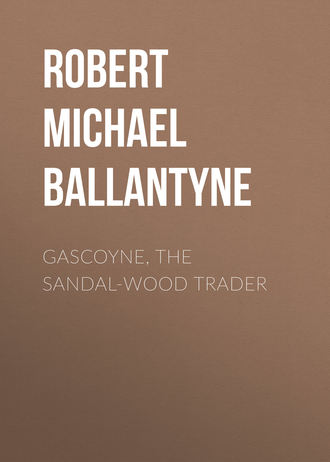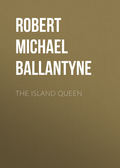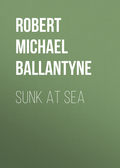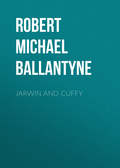
Robert Michael Ballantyne
Gascoyne, the Sandal-Wood Trader
Chapter Eight
A surprise—A battle and a fire
The sound of the Sabbath bell fell sweetly on the pastor’s ear as he descended to his dwelling to make a few final preparations for the duties of the day, and from every hut in Sandy Cove trooped forth the native Christians—young and old—to assemble in the house of God.
With great labour and much pains had this church been built, and pastor and people alike were not a little proud of their handiwork. The former had drawn the plans and given the measurements, leaving it to Henry Stuart to see them properly carried out in detail, while the latter did the work. They cut and squared the timbers, gathered the coral, burnt it for lime and plastered the building. The women and children carried the lime from the beach in baskets, and the men dragged the heavy logs from the mountains—in some cases for several miles—the timber in the immediate neighbourhood not being sufficiently large for their purpose.
The poor natives worked with heart and soul—for love, and the desire to please and to be pleased, had been awakened within them. Besides this, the work had for them all the zest of novelty. They wrought at it with somewhat of the feelings of children at play,—pausing frequently in the midst of their toil to gaze in wonder and admiration at the growing edifice, which would have done no little credit to a professional architect and to more skilled workmen.
The white men of the place also lent a willing hand; for although some of them were bad men, yet they were constrained to respect the consistent character and blameless life of the missionary, who not unfrequently experienced the fulfilment of that word:
“When a man’s ways please the Lord, he maketh even his enemies to be at peace with him.” Besides this, all of them, however unwilling they might be to accept Christianity for themselves, were fully alive to the advantages they derived from its introduction among the natives.
With so many willing hands at work, the little church was soon finished; and, at the time when the events we are describing occurred, there was nothing to be done to it except some trifling arrangements connected with the steeple, and the glazing of the windows. This latter piece of work was, in such a climate, of little importance.
Long before the bell had ceased to toll, the church was full of natives, whose dark, eager faces were turned towards the door, in expectation of the appearance of their pastor. The building was so full, that many of the people were content to cluster round the door, or the outside of the unglazed windows. On this particular Sunday, there were strangers there, who roused the curiosity and attracted the attention of the congregation. Before Mr Mason arrived, there was a slight bustle at the door as Captain Montague, with several of his officers and men, entered, and were shewn to the missionary’s seat by Master Corrie, who, with his round visage elongated as much as possible, and his round eyes expressing a look of inhuman solemnity, in consequence of his attempt to affect a virtue which he did not possess, performed the duties of door-keeper. Montague had come on shore to ascertain from Mr Mason what likelihood there was of an early attack by the natives.
“Where’s Alice,” whispered the boy to Poopy, as the girl entered the church, and seated herself beside a little midshipman, who looked at her with a mingled expression of disgust and contempt, and edged away.
“Got a little headache, hee! hee!”
“Don’t laugh in church, you monster,” said Corrie, with a frown.
“I’se not larfin,” retorted Poopy, with an injured look.
Just then the boy caught sight of a gigantic figure entering the church, and darted away to usher the stranger into the pastor’s seat; but Gascoyne (for it was he) took no notice of him. He passed steadily up the centre of the church, and sat down beside the Widow Stuart, whose face expressed anxiety and surprise the moment she observed who was seated there. The countenance of Henry, who sat on the other side of his mother, flushed, and he turned with an angry glance towards the captain of the Foam; but the look was thrown away, for Gascoyne had placed his arms on the back of the seat in front of him, and rested his head on them; in which position he continued to remain without motion while the service was going on.
Mr Mason began with a short earnest prayer in English; then he read out a hymn in the native tongue, which was sung in good tune, and with great energy, by the whole congregation. This was followed by a chapter in the New Testament, and another prayer; but all the service, with the exception of the first prayer, was conducted in the native language. The text was then read out:– “Though thy sins be as scarlet, they shall be white as snow; though they be red like crimson, they shall be as wool.”
Frederick Mason possessed the power of chaining the attention of an audience, and a deep breathless silence prevailed, as he laboured, with intense fervour, to convince his hearers of the love of God, and the willingness and ability of Jesus Christ to save even the chief of sinners. During one part of the service, a deep low groan startled the congregation; but no one could tell who had uttered it. As it was not repeated, it was soon forgotten by most of the people.
While the pastor was thus engaged, a pistol-shot was heard, and immediately after, a loud fierce yell burst from the forest, causing the ears of those who heard it to tingle, and their hearts for a moment to quail. In less than ten minutes, the church was empty, and the males of the congregation were engaged in a desperate hand-to-hand conflict with the savages; who, having availed themselves of the one unguarded pass, had quietly eluded the vigilance of the scouts, and assembled in force on the outskirts of the settlement.
Fortunately for the worshippers that morning, the anxiety of Master Corrie for the welfare of his fair Alice induced him to slip out of the church just after the sermon began. Hastening to the pastor’s house, he found the child sound asleep on a sofa, and a savage standing over her with a spear in his hand. The boy had approached so stealthily, that the savage did not hear him. Remembering that he had left his pistol on the kitchen table, he darted round to the back door of the house, and secured it just as Alice awoke with a scream of surprise and terror, on beholding who was near her.
Next moment Corrie was at her side, and before the savage could seize the child, he levelled the pistol at his head and fired. The aim was sufficiently true to cause the ball to graze the man’s forehead, while the smoke and fire partially blinded him.
It was this shot that first alarmed the natives in church, and it was the yell uttered by the wounded man, as he fell stunned on the floor, that called forth the answering yell from the savage host, and precipitated the attack.
It was sufficiently premature to give the people of the settlement time to seize their arms; which, as has been said, they had placed so as to be available at a moment’s notice.
The fight that ensued was a desperate, and almost indiscriminate melée. The attacking party had been so sure of taking the people by surprise, that they formed no plan of attack; but simply arranged that, at a given signal from their chief, a united rush should be made upon the church, and a general massacre ensue. As we have seen, Corrie’s pistol drew forth the signal sooner than had been intended. In the rush that immediately ensued, a party dashed through the house, the boy was overturned, and a savage gave him a passing blow with a club that would have scattered his brains on the floor had it taken full effect; but it was hastily delivered; it glanced off his head, and spent its force on the shoulder of the chief, who was thus unfortunate enough to be wounded by friends as well as foes.
On the first alarm, Gascoyne sprang up, and darted through the door. He was closely followed by Henry. Stuart, and the captain of the Talisman, with his handful of officers and men, who were all armed, as a matter of course.
“Sit where you are,” cried Henry to his trembling mother, as he sprang after Gascoyne; “the church is the safest place you’ll find.”
The widow fell on her knees and prayed to God, while the fight raged without.
Among the first to leave the church was the pastor. The thought of his child having been left in the house unprotected, filled him with an agony of fear. He sought no weapon of war, but darted unarmed straight into the midst of the savage host that stood between him and the object of his affection. His rush was so impetuous, that he fairly overturned several of his opponents by dashing against them. The numbers that surrounded him, however, soon arrested his progress; but he had pressed so close in amongst them, that they were actually too closely packed, for a few seconds, to be able to use their heavy clubs and long spears with effect.
It was well for the poor missionary, at that moment, that he had learned the art of boxing when a boy! The knowledge so acquired had never induced him to engage in dishonourable and vulgar strife; but it had taught him how and where to deliver a straightforward blow with effect; and he now struck out with tremendous energy, knocking down an adversary at every blow,—for the thought of Alice lent additional strength to his powerful arm. Success in such warfare, however, was not to be expected. Still, Mr Mason’s activity and vigour averted his own destruction for a few minutes; and these minutes were precious, for they afforded time for Captain Montague and his officers to cut their way to the spot where he fought, just as a murderous club was about to descend on his head from behind. Montague’s sword unstrung the arm that upheld it, and the next instant the pastor was surrounded by friends.
Among their number was John Bumpus, who was one of the crew of Montague’s boat, and who now rushed upon the savages with a howl peculiarly his own, felling one with a blow of his fist, and another with a slash of his cutlass.
“You must retire,” said Montague, hastily, to Frederick Mason, who stood panting and inactive for a few moments in order to recover breath. “You are unarmed, sir; besides, your profession forbids you taking part in such work as this. There are men of war enough here to keep these fellows in play.”
Montague spoke somewhat sharply, for he erroneously fancied that the missionary’s love of fighting had led him into the fray.
“My profession does not forbid me to save my child,” exclaimed the pastor, wildly.
He turned in the direction of his cottage, which was full in view; and, at that moment, smoke burst from the roof and windows. With a cry of despair, Mr Mason once more launched himself on the host of savages; but these were now so numerous that, instead of making head against them, the little knot of sailors who opposed them at that particular place found it was as much as they could do to keep them at bay.
The issue of the conflict was still doubtful, when a large accession to their numbers gave the savages additional power and courage. They made a sudden onset, and bore back the small band of white men. In the rush the pastor was overthrown and rendered for a time insensible.
While this was going on in one part of the field, in another, stout Ole Thorwald, with several of the white settlers and the greater part of the native force, was guarding the principal approach to the church against immensely superior numbers. And nobly did the descendant of the Norse sea-kings maintain the credit of his warlike ancestors that day. With a sword that might have matched that of Goliath of Gath, he swept the way before him wherever he went, and more than once by a furious onset turned the tide of war in favour of his party when it seemed about to overwhelm them.
In a more distant part of the field, on the banks of a small stream, which was spanned by a bridge about fifty paces farther down, Gascoyne and Henry Stuart contended, almost alone; with about thirty savages. These two had rushed so impetuously forward at the first onset as to have been separated from their friends, and, with four Christian natives, had been surrounded. Henry was armed with a heavy claymore, the edge of which betokened that it had once seen much service in the wars of the youth’s Scottish ancestors. Gascoyne, not anticipating this attack, had returned to the settlement armed only with his knife. He had seized the first weapon that came to hand, which chanced to be an enormous iron shovel, and with this terrific implement the giant carried all before him.
It was quite unintentionally that he and Henry had come together. But the nature and power of the two men being somewhat similar, they had singled out the same point of danger, and had made their attack with the same overwhelming vehemence. The muscles of both seemed to be made of iron, for, as increasing numbers pressed upon them, they appeared to deliver their terrible blows with increasing rapidity and vigour, and the savages, despite their numbers, began to quail before them.
Just then Keona—who, although wounded, hovered about doing as much mischief as he could with his left hand, (which, by the way, seemed to be almost as efficient as his right,)—caught sight of this group of combatants on the banks of the stream. He, with a party, had succeeded in forcing the bridge, and now, uttering a shout of wild delight at the sight of his two greatest enemies within his power—as he thought—he rushed towards them and darted his spear with unerring aim and terrible violence. The man’s anger defeated his purpose, for the shout attracted the attention of Gascoyne, who saw the spear coming straight towards Henry’s breast. He interposed the shovel instantly, and the spear fell harmless to the ground. At the same time, with a back-handed sweep he brained a gigantic savage who at the moment was engaging Henry’s undivided attention. Bounding forward with a burst of anger, Gascoyne sought to close with Keona. He succeeded but too well, however, for he could not check himself sufficiently to deliver an effective blow, but went crashing against his enemy, and the two fell to the ground together.
In an instant a rush was made on the fallen man; but Henry leaped forward, and sweeping down two opponents with one cut of his claymore, afforded his companion time to leap up.
“Come, we are quits,” said Henry, with a grim smile, as the two darted again on the foe.
At that moment Ole Thorwald, having scattered the party he first engaged, came tearing down towards the bridge, whirling the great sword round his head, and shouting “victory” in the voice of a Stentor.
“Hah! here is more work,” he cried, as his eye fell on Gascoyne’s figure. “Thorwald to the rescue! hurrah!”
In another moment the savages were flying pellmell across the bridge with Gascoyne and Henry close on their heels, and the stout merchant panting after them, with his victorious band, as fast as his less agile limbs could carry him.
It was at this moment that Gascoyne and Henry noticed the attack made on the small party of sailors, and observed the fall of Mr Mason.
“Thorwald to the rescue!” shouted Gascoyne, in a voice that rolled deep and loud over the whole field like the roar of a lion.
“Ay, ay, my noisy stranger; it’s easy for your tough limbs to carry you up the hill,” gasped Ole, “but the weight of ten or fifteen years will change your step. Hurrah!”
The cry of the bold Norseman, coupled with that of Gascoyne, had the double effect of checking the onset of the enemy, and of collecting their own scattered forces around them. The battle was now drawing to a point. Men who were skirmishing in various places left off and hastened to the spot on which the closing scene was now evidently to be enacted; and for a few minutes the contending parties paused, as if by mutual consent, to breathe and scan each other before making the final attack.
It must not be supposed that, during the light which we have described, the crew of the Talisman were idle. At the first sign of disturbance on shore, the boats were lowered, and a well-armed force rowed for the landing-place as swiftly as the strong and willing arms of the men could pull. But the distance between the vessel and the shore was considerable, and the events we have recounted were quickly enacted, so that before the boats had proceeded half the distance the fight was nearly over, and the settlement seemed about to be overwhelmed.
These facts were not lost upon the first lieutenant of the Talisman, Mr Mulroy, who, with telescope in hand, watched the progress of the fight with great anxiety. He saw that it was impossible for the boats to reach the shore in time to render efficient aid. He also observed that a fresh band of savages were hastening to reinforce their comrades, and that the united band would be so overpoweringly strong as to render the chances of a successful resistance on the part of the settlers very doubtful indeed almost hopeless.
In these circumstances he adopted a course which was as bold as it was dangerous. Observing that the savages mustered for the final onset in a dense mass on an eminence which just raised their heads a little above those of the party they were about to attack, he at once loaded three of the largest guns with round shot and pointed them at the mass of human beings with the utmost possible care. There was the greatest danger of hitting friends instead of foes, but Mr Mulroy thought it his duty to incur the responsibility of running the risk.
Montague, to whom the command of the united band of settlers had been given by general consent, had thrown them rapidly into some sort of order, and was about to give the word to charge, when the savage host suddenly began to pour down the hill with frantic yells.
Mulroy did not hear the shouts, but he perceived the movement. Suddenly, as if a thunderstorm had burst over the island, the echoes of the hills were startled by the roar of heavy artillery, and, one after another, the three guns hurled their deadly contents into the centre of the rushing mass, through which three broad lanes were cut in quick succession.
The horrible noise and the dreadful slaughter in their ranks, seemed to render the affrighted creatures incapable of action, for they came to a dead halt.
“Well done, Mulroy,” shouted Montague, “forward, boys—charge!”
A true British cheer burst from the tars and white settlers, which served farther to strike terror into the hearts of the enemy. In another moment they rushed up the hill, led on by Montague, Gascoyne, Henry, and Thorwald. But the savages did not await the shock. Seized with a complete panic, they turned and fled in utter confusion.
Just as this occurred, Mr Mason began to recover consciousness. Recollecting suddenly what had occurred, he started up and followed his friends, who were now in hot pursuit of the foe in the direction of his own cottage. Quickly though they ran, the anxious father overtook and passed them, but he soon perceived that his dwelling was wrapt in flames, from end to end.
Darting through the smoke and fire to his daughter’s room he shouted her name, but no voice replied. He sprang to the bed—it was empty. With a cry of despair, and blinded by smoke, he dashed about the room, grasping wildly at objects in the hope that he might find his child. As he did so he stumbled over a prostrate form, which he instantly seized, raised in his arms, and bore out of the blazing house, round which a number of the people were now assembled.
The form he had thus plucked from destruction was that of the poor boy, who would willingly have given his life to rescue Alice, and who still lay in the state of insensibility into which he had been thrown by the blow from the savage’s heavy club.
The missionary dropped his burden, turned wildly round, and was about to plunge once again into the heart of the blazing ruin, when he was seized in the strong arms of Henry Stuart, who, with the assistance of Ole Thorwald, forcibly prevented him from doing that which would have resulted in almost certain death.
The pastor’s head sunk on his breast; the excitement of action and hope no longer sustained him; with a deep groan he fell to the earth insensible.







